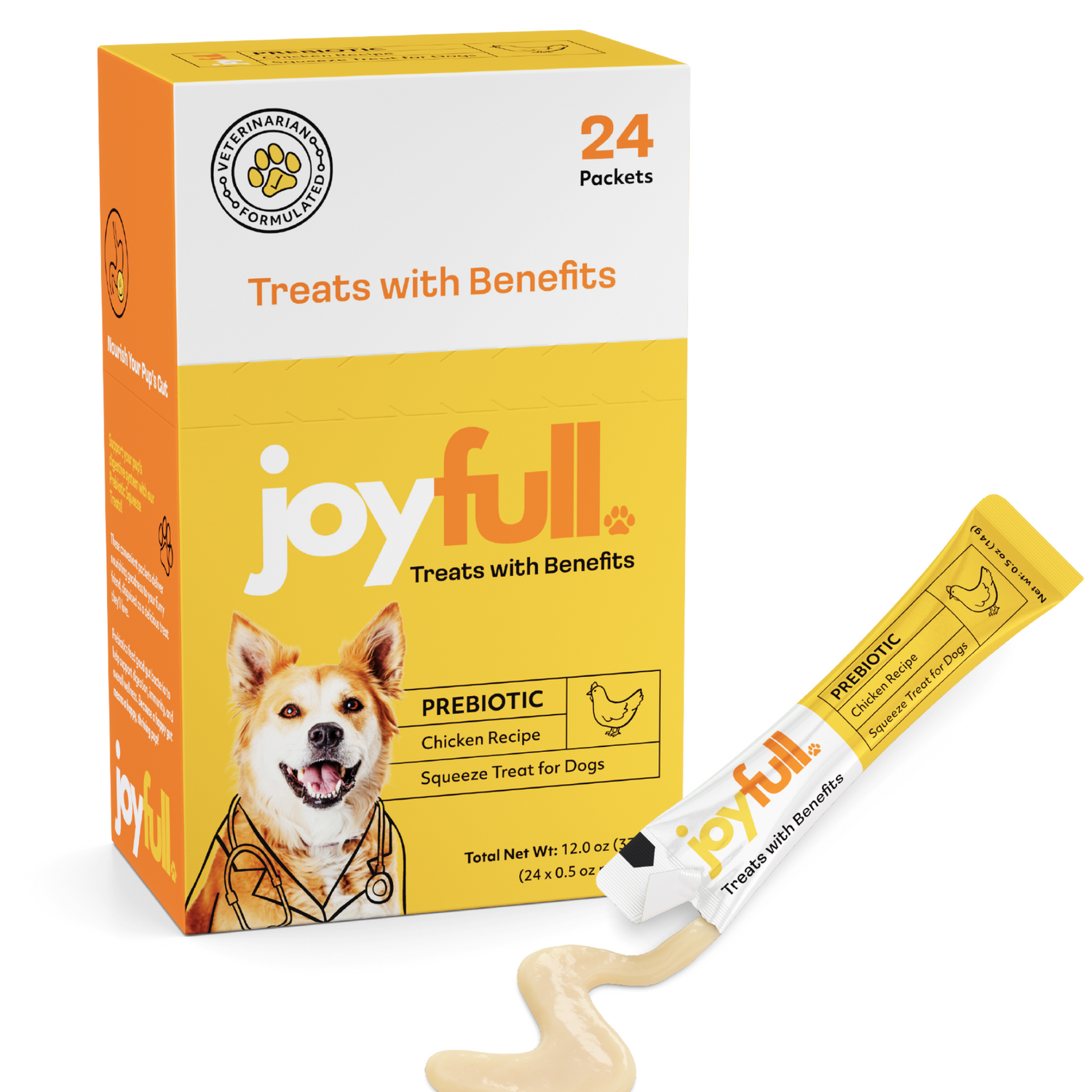
Is Rosemary Extract Safe for Dogs? A Complete Guide
So, let's get right to the heart of the matter: is rosemary extract safe for dogs?
The short answer is yes. When used in the small, carefully measured amounts found in commercial dog foods, rosemary extract is considered perfectly safe. In fact, it serves a beneficial purpose as a natural preservative.
Think of it as a natural bodyguard for the fats in your dog's kibble, keeping them fresh and preventing spoilage.
The Bottom Line on Rosemary Extract for Your Dog
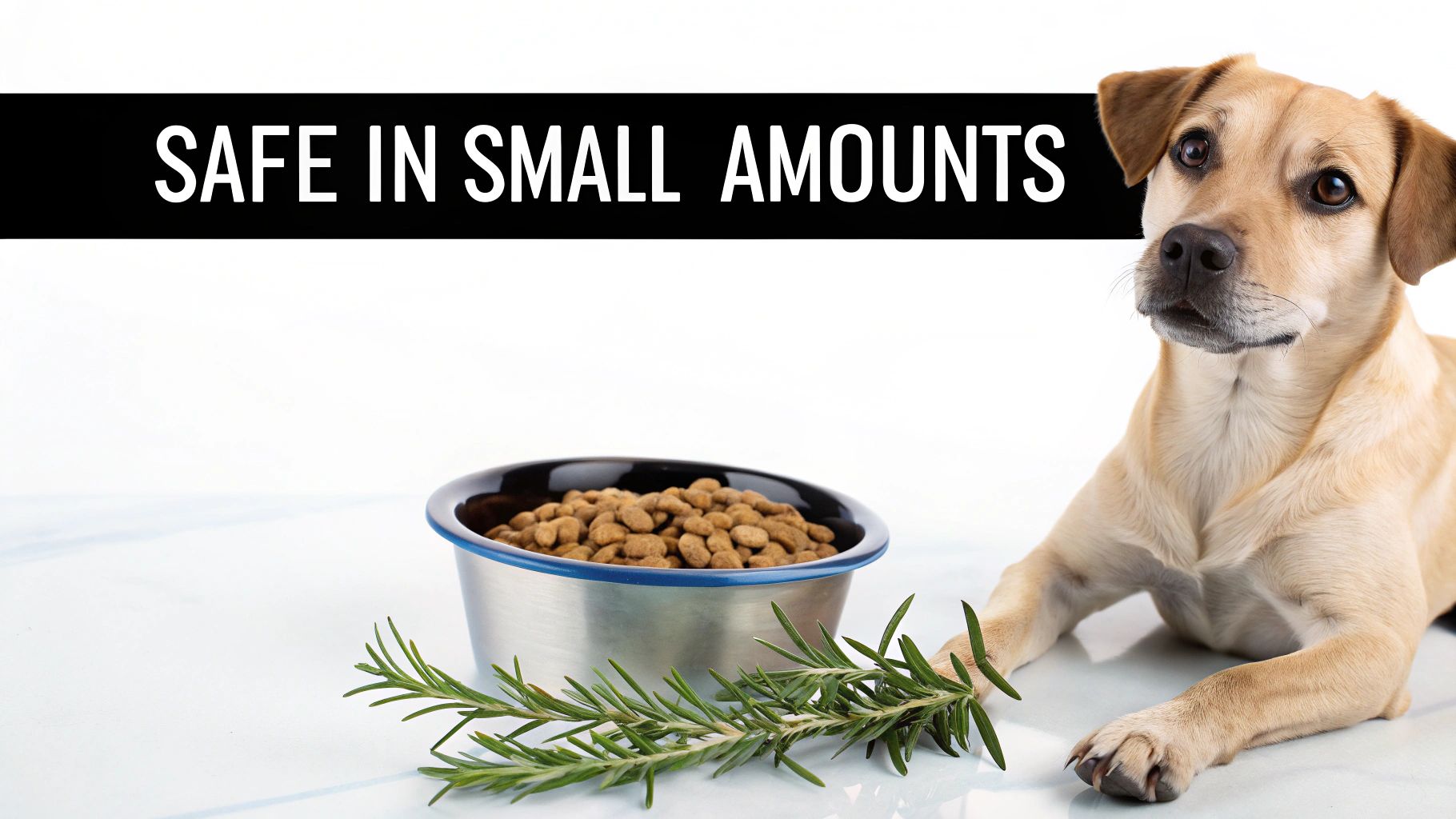
It’s completely normal to see "rosemary extract" on an ingredient list and wonder if it’s okay for your pet. Rest assured, its job in pet food is simple and important: it stops fats and oils from going rancid. This ensures the food stays safe and nutritious all the way from the factory to your dog's bowl.
It's crucial to understand that this is vastly different from rosemary essential oil, which is highly concentrated and carries a separate, more serious set of risks for pets.
Major regulatory bodies have looked into this closely. For instance, the European Food Safety Authority's panel on animal feed additives set a maximum safe level at 300 mg/kg of feed for dogs. This is a much higher concentration than you'll typically find in commercial pet foods, which gives a nice safety buffer. For a deeper dive, you can find more insights about rosemary allergies and safety guidelines on wagwalking.com.
The key is knowing the difference between the various forms of rosemary. Once you understand that, you can feel much more confident about what's going into your dog's food.
A Quick Look at Rosemary Safety for Dogs
To make it even clearer, here's a simple breakdown of the different forms of rosemary you might encounter and what they mean for your dog's safety.
| Form of Rosemary | Common Use | General Safety Level for Dogs |
|---|---|---|
| Rosemary Extract | Natural preservative in dog food | Safe in regulated amounts |
| Fresh Rosemary Herb | Occasional garnish or treat | Safe in very small quantities |
| Rosemary Essential Oil | Aromatherapy; topical products | Use with extreme caution; toxic if ingested |
As you can see, the form and the amount are what truly matter. The extract used in your dog's food is a world away from the potent essential oil.
Decoding the Ingredient Label: What's Rosemary Extract Doing in There?
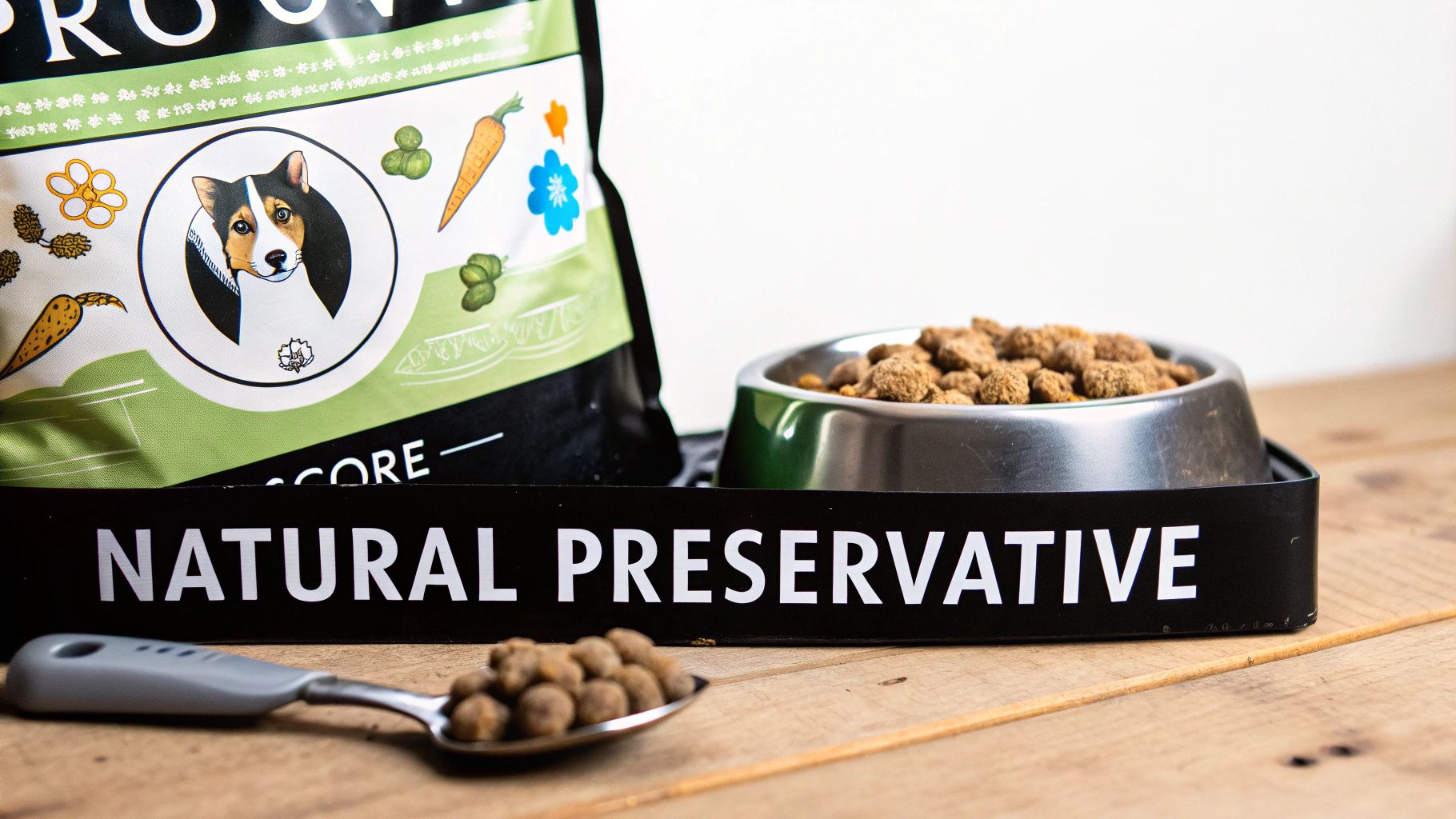
Ever glanced at your dog’s food bag, skimmed the ingredients, and hit the brakes at "rosemary extract"? If you’ve wondered what a garden herb is doing in your pup’s dinner, you're not alone. It's not there for flavor; it's playing a much more important role.
Think about what happens when you slice an apple and leave it on the counter. It turns brown pretty fast, right? That’s oxidation. The fats in your dog’s kibble can do something similar—they can go rancid. Rosemary extract acts like a spritz of lemon juice on that apple, stopping the spoilage in its tracks.
Without a preservative, the healthy fats and oils in dog food would spoil, creating a foul smell and destroying essential nutrients. The extract acts as a natural shield, protecting the food’s quality and keeping it fresh from the factory to your dog’s bowl.
A Natural Guardian of Freshness
At its core, rosemary extract is a potent antioxidant. It fights off the molecules (called free radicals) that cause decay. This makes it a fantastic natural alternative to synthetic preservatives like BHA and BHT, which many pet parents are choosing to avoid.
Using natural antioxidants allows manufacturers to keep their formulas stable and tasty. It's how they guarantee your dog gets all the nutritional goodness they packed into the food.
Rosemary extract is one of the go-to https://joyfullpet.com/blogs/news/natural-dog-food-preservatives that work quietly behind the scenes. This shift toward natural ingredients empowers you to make smarter, more confident decisions for your pet.
Understanding what each ingredient does is a huge part of finding the best dog food for puppies and adult dogs alike. When you spot rosemary extract on a label, you can see it as a good sign—the brand is committed to keeping the food fresh the natural way.
Beyond Preservation: The Potential Health Perks
While rosemary extract's primary gig in dog food is keeping it fresh, the herb itself is packed with some pretty impressive health-promoting qualities. These benefits come from powerful natural compounds within the plant, which might offer your pup more than just a longer shelf life for their kibble.
At the top of the list are its antioxidant properties. Think of antioxidants as tiny bodyguards for your dog's cells. They go around neutralizing unstable molecules called free radicals, which are culprits in aging and various diseases. By taking care of these threats, antioxidants help maintain overall cellular health.
This powerful plant also boasts some notable anti-inflammatory effects. Inflammation is a normal, healthy response to injury or illness, but when it becomes chronic, it can cause all sorts of problems. The compounds in rosemary may help calm that inflammatory response, contributing to a healthier state for your dog.
Deeper Scientific Insights
The benefits don't just stop there. Scientific research has started to uncover even more specific advantages, especially when it comes to digestive and neurological health.
For instance, some studies suggest rosemary can support a healthy gut. One interesting piece of research showed that a specific type of rosemary extract helped protect against gastric issues in a lab setting, pointing to its potential gastrointestinal benefits. Other work has highlighted its anti-inflammatory action, suggesting it could even be helpful in managing neurological conditions linked to inflammation. You can dig into some of these vet-approved findings on rosemary's properties on vetplayas.com.
It's crucial to remember that the amount of rosemary extract in dog food is minimal. It is there to preserve the food, not to act as a therapeutic supplement.
While these scientific findings are exciting, we need to keep things in perspective. The tiny amount used to preserve kibble isn't enough to act like a full-blown therapeutic treatment. Still, these inherent properties certainly add to its value as a natural, functional ingredient. It’s a lot like other natural ingredients that pull double duty; for example, you can learn more about turmeric for dogs in our detailed guide, another powerful anti-inflammatory.
Understanding the Risks and Potential Side Effects
While the tiny amounts of rosemary extract used as a preservative are widely considered safe, it's smart to look at the whole picture. The key thing to remember is that not all forms of rosemary are created equal—the dose and concentration make all the difference.
Take the fresh rosemary plant, for example. The ASPCA lists it as non-toxic, which is great news for curious garden-sniffers. But "non-toxic" doesn't mean "zero risk." If your dog decides to treat your rosemary bush like a chew toy, they could still end up with an upset stomach, vomiting, or diarrhea from all that roughage. You can review the ASPCA's full plant safety guide for more details.
The real danger lies with rosemary essential oil. This is a highly concentrated form that can be neurotoxic if a dog ingests it, posing a serious threat to some pets.
When to Be Extra Cautious
The biggest red flag for rosemary is for dogs with pre-existing health issues, particularly seizure disorders like epilepsy. Highly concentrated rosemary oil contains compounds like camphor, which can stimulate the nervous system and potentially lower the seizure threshold.
Because of this potential risk, owners of dogs with epilepsy or other seizure-related conditions should steer clear of rosemary essential oil entirely.
It's also worth noting that the safety of any supplement hinges on its quality. Rigorous herbal supplement testing is crucial to guarantee that the final extract in your dog's food is pure, potent, and free from harmful contaminants.
The infographic below breaks down the main benefits we see from rosemary, all stemming from its impressive antioxidant, anti-inflammatory, and digestive properties.
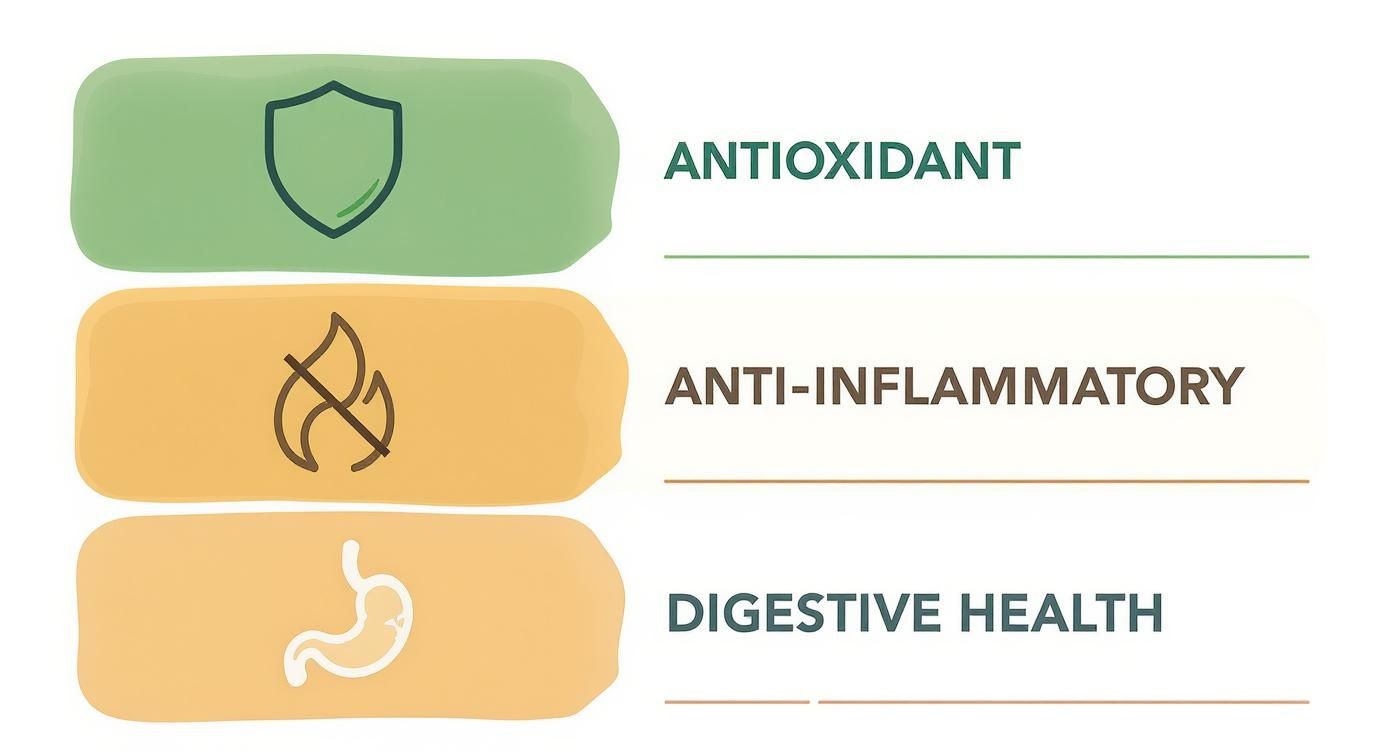
As you can see, its powerful antioxidant effects are the foundation for its other potential health perks.
Signs of an Adverse Reaction
Adverse reactions are rare, but they can happen. Knowing what to look for means you can step in quickly if something seems off.
Keep an eye out for these potential warning signs:
- Mild Digestive Upset: The most common culprits are vomiting or diarrhea, usually after a dog has munched on too much of the fresh plant.
- Skin Irritation: If you spot redness, itching, or hives, it could be a sign of an allergic reaction, either from something they touched or ate.
- Neurological Issues: This is the most serious category, typically linked to essential oil exposure. Look for stumbling, tremors, or, in the worst-case scenario, seizures.
If you spot any of these symptoms after your dog has come into contact with rosemary, don't wait. Call your veterinarian right away for professional advice.
How to Safely Share Rosemary with Your Dog
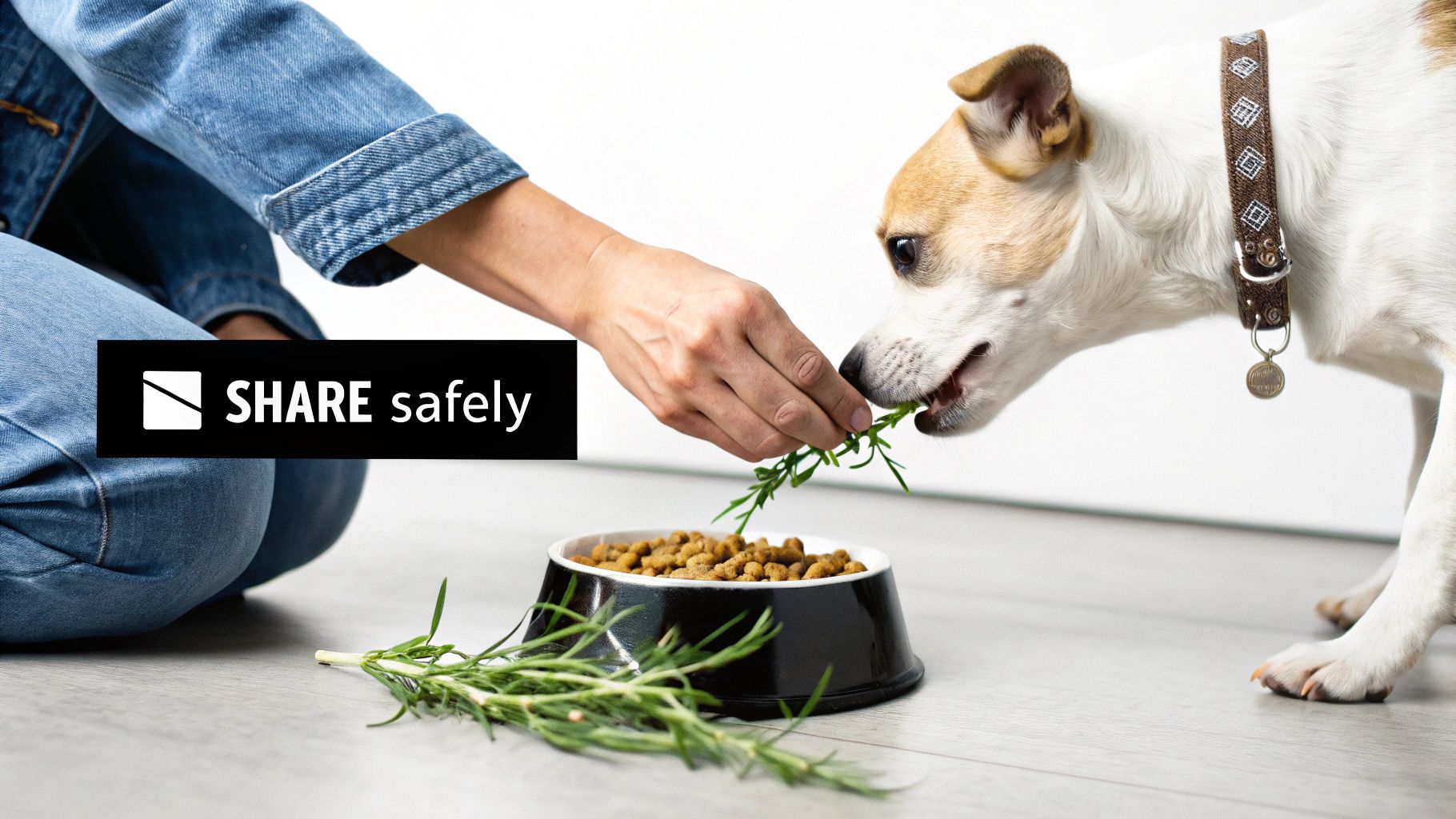
When it comes to giving your dog rosemary, the safest and most reliable way is already handled for you in their food. High-quality commercial dog foods often use carefully measured amounts of rosemary extract, taking all the guesswork out of the equation. In these formulas, it’s there to act as a natural preservative, not as a health supplement.
If you love cooking with fresh herbs, you might be tempted to share. A tiny pinch of finely chopped fresh rosemary offered as an occasional treat is generally okay for most dogs. Think of it more like a rare, flavorful garnish than a regular part of their diet.
However, there's one form you must unequivocally avoid: rosemary essential oil. Never let your dog ingest it or apply it to their skin unless you are under the direct, explicit guidance of your vet. The oil is incredibly concentrated and potent, making it a serious risk, especially for dogs with underlying health issues.
Smart and Safe Rosemary Practices
Knowing the clear do's and don'ts is the best way to keep your best friend safe. The easiest approach is to trust reputable dog food brands, as they follow strict safety standards set by organizations like AAFCO. If you want to get better at spotting quality ingredients, our guide on how to read dog food labels is a great place to start.
The fundamental rule here is simple: "natural" doesn't automatically mean "safe" in any amount. The specific form and the dose are what separate a beneficial ingredient from a potential hazard.
To make this even clearer, I’ve put together a quick reference table to help you distinguish between safe and unsafe rosemary practices for your dog.
Safe vs Unsafe Rosemary Practices for Dogs
This simple guide breaks down the right and wrong ways to handle rosemary around your canine companion.
| Practice | Safety Level | Guideline |
|---|---|---|
| Commercial Dog Food | Safe | Contains regulated, trace amounts of rosemary extract for preservation. |
| Fresh Rosemary Leaves | Use Sparingly | A tiny, finely chopped pinch as a rare treat is generally fine. |
| Rosemary Essential Oil | Unsafe | Never give internally or apply topically without veterinary supervision. |
Sticking to these guidelines ensures you can keep your dog safe while still benefiting from the natural ingredients that quality pet foods have to offer.
Common Questions About Rosemary and Your Dog
Let's clear up some of the most common questions and concerns I hear from pet parents about rosemary. Getting straight answers will help you feel much more confident about what you're putting in your dog's bowl.
Can Rosemary Extract Cause Seizures in Dogs?
This is probably the biggest worry I see, and it comes from a legitimate place. The concern over seizures is almost always tied to highly concentrated rosemary essential oil, not the small amounts of extract found in pet food.
Rosemary oil is packed with a compound called camphor. In high doses, camphor can overstimulate the nervous system, which is a known risk for dogs already prone to seizures or epilepsy.
But here's the key difference: the amount of rosemary extract used as a natural preservative in dog food is minuscule. We're talking trace amounts that are highly unlikely to cause a problem, even in a sensitive dog. While it’s always smart to avoid essential oils around dogs with seizure disorders, the extract in their kibble is widely considered safe by veterinarians.
Is Rosemary Extract Bad for Dogs with Allergies?
It's not on the list of common allergens, but just like with people, a dog can develop an allergy to pretty much any ingredient. Interestingly, true food allergies in dogs usually show up as skin problems, not just an upset stomach.
Keep an eye out for signs of a potential rosemary allergy, such as:
- Chronic Itchy Skin: Is your dog constantly scratching, licking, or chewing at their paws, ears, or belly?
- Recurring Ear Infections: Red, smelly ears or constant discharge can often point back to a food sensitivity.
- Stomach Upset: While less frequent, vomiting or diarrhea can sometimes be a sign.
If you spot these symptoms after switching to a food containing rosemary extract, it's a good idea to chat with your vet. They can help you get to the bottom of it, usually with a carefully planned elimination diet to pinpoint the real trigger.
The bottom line is that while a rosemary allergy isn't common, it’s not impossible. Simply paying close attention to your dog's skin and digestion is always a good habit when you introduce a new food.
How Can I Be Sure My Dog's Food Has a Safe Amount?
This is where you get to be a bit of a detective. Your best tool is the ingredient label on the back of the bag. In the United States, pet food ingredients are listed by weight, from most to least.
You'll almost always find rosemary extract listed near the very end of the ingredient list. It typically appears after all the main proteins, carbohydrates, and even the added vitamins and minerals. Its position at the end of the line is your confirmation that it's only there in a tiny, safe amount to act as a preservative.
Trusted dog food brands that follow the guidelines set by AAFCO (Association of American Feed Control Officials) stick to strict safety standards, ensuring the amount is well within a range that won't cause harm.
At Joyfull, we're all about transparency and using only top-tier, science-backed ingredients to help your pets thrive. We craft our formulas with the same care you do because we know your pet's health is everything. See our commitment to clean, beneficial pet nutrition for yourself at https://joyfullpet.com.
